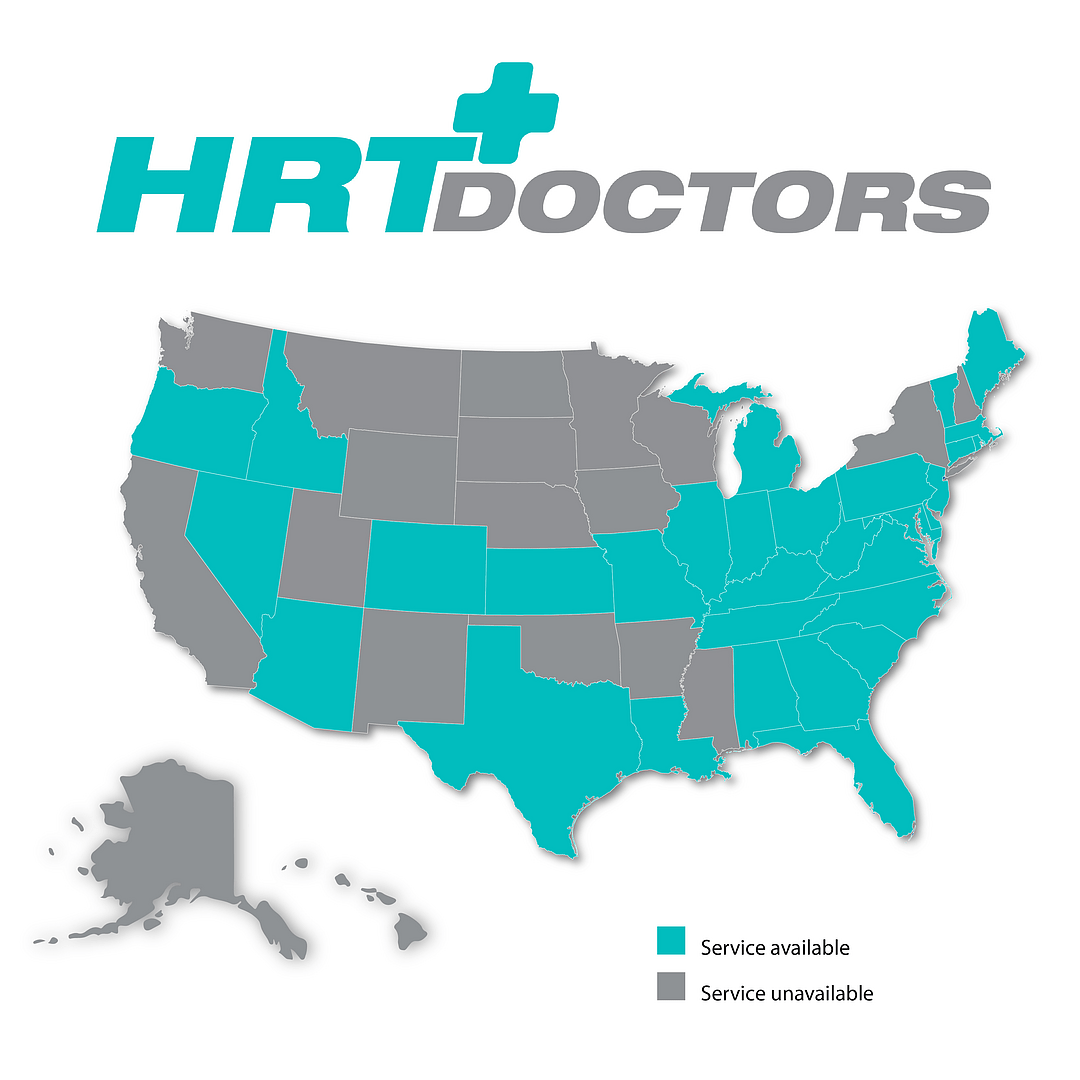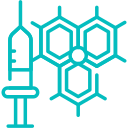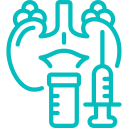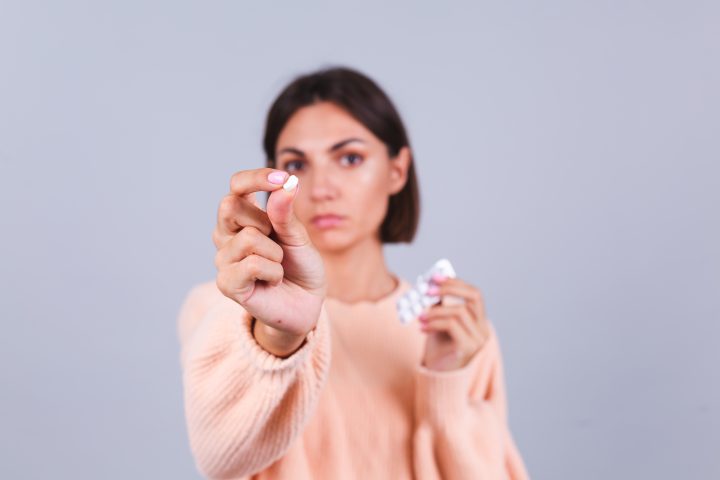Testosterone Replacement Therapy & Online TRT Clinic
HRT Doctors is an online TRT clinic specializing in Testosterone Replacement Therapy (TRT) for male patients. We are fully licensed and provide service to 38 states nationwide.
At HRT Doctors Group, the leading online TRT clinic, every doctor is an expert in TRT. $89.95 includes a comprehensive hormone blood test at your local Quest Diagnostics and an in-depth consultation with one of our board-certified doctors.

 Lab & Telehealth Medical Review
Lab & Telehealth Medical Review Testosterone injections
Testosterone injections Testosterone Cream
Testosterone Cream Anastrozole Tablets
Anastrozole Tablets Enclomiphene Citrate Capsules
Enclomiphene Citrate Capsules Doctor Follow-up Visits
Doctor Follow-up Visits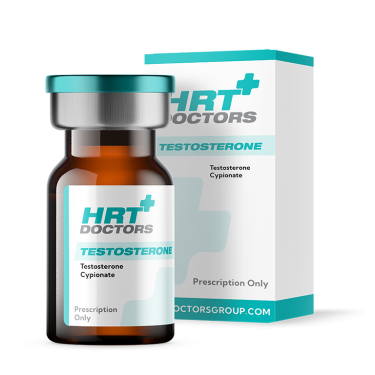
Understanding TRT: A Comprehensive Guide
Have you ever felt like your energy drops, your mood swings, and you’re not as lively as before? If yes, you’re not alone. Many people, regardless of gender, experience these feelings, often linked to a hormone called testosterone.
TRT, or Testosterone Replacement Therapy for men, is a telemedicine treatment designed to fix hormone imbalances, especially low testosterone levels. Testosterone controls:

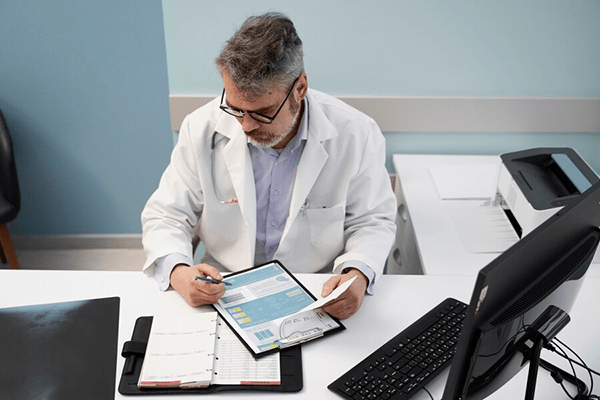
Deciphering Low Androgen: Signs and Symptoms
Here, we outline the main signs that strongly indicate a testosterone deficiency:
- Fatigue and Low Energy – Experiencing constant tiredness and lethargy, even with sufficient rest, is a clear indicator of low testosterone.
- Mood Swings – Testosterone plays a significant role in regulating mood. Reduced levels can lead to mood swings, irritability, and even bouts of sadness.
- Decreased Muscle Growth – Maintaining muscle mass becomes more challenging as testosterone levels drop. You may notice diminishing results from your gym efforts or, worse, a loss of muscle despite regular exercise.
- Low Libido – Testosterone’s impact on sexual desire extends to both men and women.
- Cognitive Impairments – Challenges with focus, memory lapses, and a feeling of “brain fog” can all be associated with low hormone levels.
If you’re experiencing a combination of these symptoms and their effects, it may be worth considering the possibility of obtaining an online TRT prescription.
The Advantages of Testosterone Replacement Therapy
Imagine a life where fatigue is replaced with abundant vitality, mood swings give way to emotional stability, and a declining libido reawakens with enthusiasm. This transformative change is achievable through online testosterone therapy, a medical treatment that has been positively impacting the lives of numerous individuals. Let’s explore the benefits of this highly effective therapy in more detail.
TRT Clinic Treatment Options
Testosterone Replacement Therapy (TRT) offers various treatment methods, each tailored to different preferences and needs. Let’s explore the primary options, focusing on the effectiveness and advantages of TRT injections:
TRT Injections: These injections, also known as testosterone cypionate or enanthate injections, are among the most popular and effective methods. Administered by a healthcare professional, they provide precise dosages, ensuring quick and consistent results. Many people find the convenience and reliability of injections appealing.
Topical Testosterone: This alternative involves applying a gel, cream, or patch containing testosterone directly to the skin. While it offers a non-invasive option compared to injections, it may require more frequent applications and can potentially cause skin irritation.
Oral Testosterone: Oral testosterone pills are available but less commonly used due to concerns about potential liver toxicity and uneven absorption rates. They may be an option for individuals who cannot tolerate injections or topical treatments.
Pellet Therapy: Testosterone pellets are surgically implanted under the skin, usually in the buttocks. They release testosterone gradually over several months, reducing the need for frequent interventions. However, the procedure itself involves a minor surgical process.
Nasal Testosterone: Nasal testosterone gel, a less common choice, involves applying a gel inside the nasal passages. Like topical treatments, it might require more frequent application.
Each of these TRT options has its own set of advantages and considerations, and the choice should be made in consultation with a healthcare provider based on individual needs and preferences.
TRT Expenses: What Influences Costs?
Considering Testosterone Replacement Therapy (TRT) to regain your vitality and well-being? If so, you’re probably curious about the associated costs. Let’s explore the factors that influence the cost of TRT, ensuring you have a comprehensive understanding.
The expenses of TRT, especially when acquired online, can vary significantly based on several key factors, including:
Treatment Type: The specific type of therapy you choose will impact the cost. Options include injections, topical gels, oral medications, and medicated granules. Injections, given less frequently, may be more expensive.
Dosage and Frequency: Your healthcare provider will customize the dosage and treatment frequency to your individual needs, potentially affecting the overall cost.
Medication Costs: The price of the testosterone medication itself varies based on the type and brand. Generic alternatives are often more budget-friendly.
Treatment Duration: The length of your TRT journey influences the total cost. TRT usually involves ongoing treatment, resulting in accumulated expenses over time.
Supplementary Medications: In some cases, additional medications or supplements may be prescribed to manage side effects or optimize treatment, which can increase overall costs.
Treatment Plan: Some individuals may require more intensive monitoring and adjustments to their treatment plan, potentially impacting expenses.
Understanding these factors will help you assess the potential costs associated with your TRT journey and make informed decisions about your treatment.
Wondering If You Require an Online TRT Prescription?
Symptoms diverge between genders. Initiate your journey with a free consultation with our team to accurately identify and address your symptoms.
General Symptoms of Testosterone Deficiency Include:
| Men | Women |
|---|---|
| Diminished Muscle Strength | Fatigue |
| Reduced Sperm Count | Muscular Weakness |
| Low Libido | Low Libido |
| Erectile Dysfunction | Concentration Deficit |
| Bone Mass Reduction | Hair Thinning |
| Weight Gain | Vaginal Dryness |
| Sleep Disturbances | Weight Gain |
| Mood & Energy Decline | Mood & Energy Decline |
Obtain Your TRT Prescription Online Through Board-Certified Doctors
Explore testosterone replacement therapy (TRT) with HRT Doctors Group’s board-certified doctors accessible by telemedicine in 38 states nationwide. HRT Doctors Group offers telehealth-based TRT programs.
Start with blood test that’s completed at any local Quest Diagnostics. Once the lab results come back, you’ll be scheduled for a consultation with one of our board-certified Doctors. During the consultation, our Doctors will review the lab work, identify any exclusionary conditions, and advise if you would be an appropriate patient for testosterone replacement therapy or not. If it’s determined that you are an appropriate patient, a specific protocol will be recommended and the TRT prescription will be sent to our pharmacy so that your medications are prepared and shipped directly to you.
How to get your prescribed testosterone online
Here’s How to Secure Your TRT Prescription Online
- Complete patient on-boarding forms.
- Complete blood test at any local Quest Diagnostics. You can expect to receive a Quest Diagnostics lab requisition within 3 hours of completing our patient on-boarding forms.
- Formal consultation with one of our board-certified Doctors.
- If it’s determined that you’re an appropriate patient for testosterone therapy, medications will be shipped to you and patient support will work to ensure your medications are properly administered.
How Much Does Our Unparalleled TRT Plan Cost?
HRT Doctors Group is a private pay program and does not any insurance. We have a transparent pricing policy as our pricing page is published on our website.
HRT Doctors Group has a flat-fee model. It’s always $229 per month regardless of the number of medications in your treatment protocol. The $229 includes UPS 2nd day air shipping, on-going blood tests, access to our family telemedicine service, and no co-pays or fees when you meet with our Doctors, nurses, or medical staff.
When Will I Receive My Medication?
Anticipate your TRT medication at your doorstep within ten business days of your consultation, with special packaging for medications requiring cold storage, shipped 2nd day air for your convenience.
Why choose our online clinic for remedies and prescriptions?
Selecting an HRT online trt clinic for Testosterone Replacement Therapy and online prescription testosterone services provides a multitude of benefits to streamline and enhance your journey towards vitality:
- Specialization in Hormone Therapy
Our trt doctor consultations at HRT specialize in hormone therapy, ensuring the highest level of care. We possess a deep understanding of TRT intricacies and customize treatments to suit your unique requirements.
- Convenient Online Accessibility
The demands of daily life often leave minimal room for healthcare appointments. Our online platform grants you access to top-tier TRT services from the convenience of your home, eliminating lengthy waits in waiting rooms.
- Tailored Treatment Blueprints
We acknowledge that every individual is distinct, as are their hormonal necessities. Our healthcare providers collaborate closely with you to craft a personalized treatment plan geared toward optimizing your well-being.
- Continuous Assistance
Your journey to vitality extends beyond acquiring a prescription. We extend continuous support and monitoring to maintain treatment efficacy and ensure you reap the rewards of balanced hormone levels.
Opting for our HRT online testosterone clinic for your TRT near me treatment and prescriptions is an investment in your well-being. Our unwavering commitment to expertise, convenience, personalization, and sustained support guarantees a seamless and effective path to vitality. Don’t allow low testosterone to hinder your pursuit of a fulfilling life!
Our board-certified HRT and TRT doctors use telemedicine to give convenient and more affordable access to Quality Care. Our practice addresses male patients. Our clinical practice can provide guidance to new patients seeking hormone therapy options or existing patients that are simply looking to switch to a more convenient telemedicine-based practice.
 Dr. Jay Flottman
Dr. Jay Flottman
 Dr. Melissa VanSickle
Dr. Melissa VanSickle
 Dr. Kevin Kargman
Dr. Kevin Kargman
 Dr. Peter Nwoke
Dr. Peter Nwoke
 Carleigh Ferrier PA-C
Carleigh Ferrier PA-C

The numerous health problems that men face as they age are treated in our medical programme. Our board-certified medical Doctors provide lab work, consultations, and evidence-based treatment at a fixed and affordable price.

We provide our patients a fixed price to accommodate their unique requirements. Our practice provides convenient care so that patients don’t have to sit in a waiting room. Patients in rural or urban areas across the US have access to specialised care via our telemedicine platform.
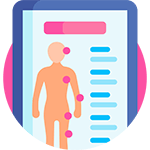
Our healthcare professional will collaborate with you to identify solutions for your health objectives, with a focus on your overall health and well-being. Our speciality is our commitment to you.

TRT & HRT
Are you ready to change your life by regaining your health? There is never a better moment to start managing your health than right NOW.
We have partnered with the nationwide laboratory, Quest Diagnostics, to provide accurate lab blood work testing and results.
TRT and Deca: The Power Duo Rewriting the Rules of Hormone Therapy
TRT and Deca: The Power Duo Rewriting the Rules of Hormone Therapy Introduction Hormone therapy is often used to help men who have low levels of testosterone.
The Truth About TRT and Alcohol: Can You Raise Testosterone and a Glass?
The Truth About TRT and Alcohol: Can You Raise Testosterone and a Glass? Introduction Testosterone is a hormone that plays an important role in the human body, especially in men.
TRT and Statins: Two Roads, One Body — Navigating the Crossroads of Therapy
TRT and Statins: Two Roads, One Body — Navigating the Crossroads of Therapy Introduction: The Intersection of Hormonal and Cardiovascular Therapies Testosterone Replacement Therapy (TRT) and statins are two medical treatments that often come up in health care today.
TRT and Clomid: Two Paths, One Goal – Unlocking Your Hormonal Potential
TRT and Clomid: Two Paths, One Goal – Unlocking Your Hormonal Potential Introduction: Understanding Hormonal Health in Men Testosterone is one of the most important hormones in the male body.













